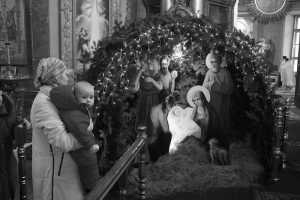 The long, cold autumn is drawing to a close. The real cold is setting in. Winter is approaching with its snowfall, snowstorms, and blizzards, driving us inside all the more quickly, so that we (and our noses) might not show the cold. And awaiting us with winter is one one of the longest fasts…
The long, cold autumn is drawing to a close. The real cold is setting in. Winter is approaching with its snowfall, snowstorms, and blizzards, driving us inside all the more quickly, so that we (and our noses) might not show the cold. And awaiting us with winter is one one of the longest fasts…
How much has been written about the dietary benefits of fasting! Moreover, as soon as you open the calendar, there it is: dry-eating, raw-eating, and oil-free-eating. Of course, knowing the monastic rules of abstinence is useful, but for the average parishioner it is more important to keep to a fast that is prudent, feasible, and edifying – and, anyway, monks know the fasting rules practiced in their monasteries even without a calendar.

Fr. Andrei Efanov
Before beginning the fast, let us think about why we need it. The Lord says that His disciples will fast when the bridegroom shall be taken away from them [Mark 2:20]. That means that we fast because something is going wrong in our lives. It is not normal for a bride to be separated from her bridegroom. It is likewise not normal for us, Christians, to be apart from Christ. The fast, therefore, is like mourning during a period of grief. Feeling in our hearts that as the heavens are higher than the earth, so are My ways higher than your ways, and My thoughts than your thoughts (Isaiah 55:9), we seek a means to rectify the disastrous disparity that presently exists between our lofty calling and the low level of our spiritual condition. Why are we so unspiritual? Because of our lack of faith. A person of deep faith cannot live so thoughtlessly, superficially, and nonchalantly. How can we strengthen our faith? Through prayer and fasting.
To fast is to abstain. During the fast we tend to place a great deal of importance in bodily food, but do we similarly abstain from luxuries for the soul? For just as the body grows soft from non-fasting foods, so too does the soul – when satiated from early in the morning until late at night by an unending stream of news and entertainment from television shows, movies, and books – grow sluggish at prayer and insensitive to spiritual experience. Of primary importance during a fasting period is forcing ourselves to limit our entertainment. Abstinence from food should serve to help the soul overcome temptation. We often forget about the most important thing, remembering only what we can and cannot put into our mouths. Straining at a gnat, indeed.
Proper fasting means lowering one’s eyes and avoiding temptation. “Losing” the power cord to the television. Using the Internet only to visit necessary and edifying sites. “Discovering” additional canons in the prayer book. Forgiving every single offence and debt. Helping the needy: feeding the hungry, consoling the sorrowful, visiting inmates (an ancient Christian virtue long since forgotten), helping an ailing neighbor, or sharing your income with a family with many children, even if you do not regularly see them standing in church with you. Such fasting behooves a bride grieving from her long separation from her bridegroom. Carefully studying ingredients or purchasing fasting mayonnaise or sausage is more reminiscent of Pharisaism than Christianity.
Our agrarian past has left its mark on our fasts. Not everyone knows that there used to be fasts in the autumn. But what kind of fast can farmers gathering the harvest from dawn to dusk be expected to keep? The autumn fasts were abolished, but the Nativity Fast was invested with monastic strictness: now laypeople fast for the entire forty days on par with monks. Only now do few people work the earth; those in cities need to work whether it is fall or winter. But this should not get in the way of our abstinence, so long as abstinent feelings will be the main thing, with the forgoing of non-fasting foods serving only to assist this primary abstinence.
Proper fasting should be judged by its fruits. When a gardener plants a tree he is less concerned with the beauty of the branches and leaves than with getting a rich harvest. So, too, should our fasting not be conspicuous in its external piety, but rather in the profit it brings to our souls. Without profit, it is completely pointless! If sham humility rather than true humility increases in our souls; if there is increase in impudence and irritation towards others rather than godly zeal; and if instead of seeing our sins we condemn our neighbors – then our fasting will bring us only harm.
Preparing for the fast, let us be prepared to break it at any moment. Bodily fasting is put aside when we need to feed our guests (not embarrassing them by forcing them to eat alone) or when we ourselves are someone’s guests. Even inner fasting is less important than the involvement we should show to those in need of our sympathy and support. However, having put aside a day’s fasting for the sake of our neighbors, let us increase it the next day, that this time of abstinence might be profitable to our souls.
Each of the fasts concludes with a particularly revered feast day. We prepare for the Nativity of Christ during the time of the fast itself, gradually introducing festal hymns into the divine services. We should not, however, limit ourselves to only this. The people of the Old Testament prepared themselves for the coming of the Messiah through guarding the true faith, offering sacrifice, showing repentance, and leading a life of piety. So too should we prepare our souls for the Feast of Christ’s Nativity through repentance at Confession, through evangelic piety, and through strengthening our faith by means of prayer, fasting, and the sacrifice that is dearest to God: a heart that is broken and humbled (Psalm 50:19). Such fasting will not be in vain, but will yield the manifold fruits of the Holy Spirit in our hearts.


















